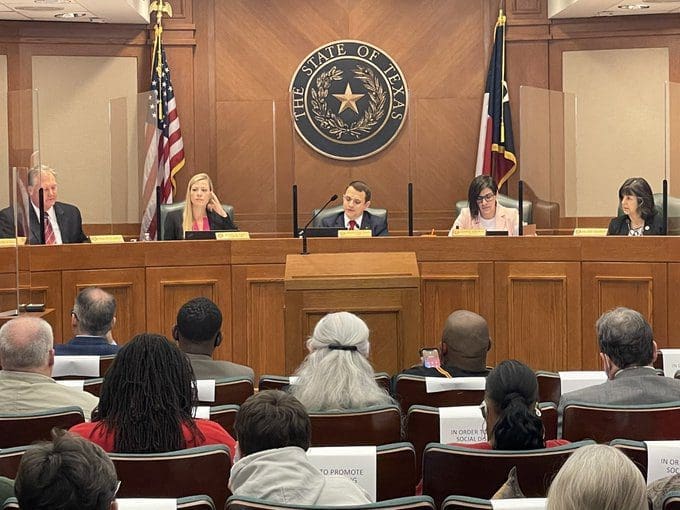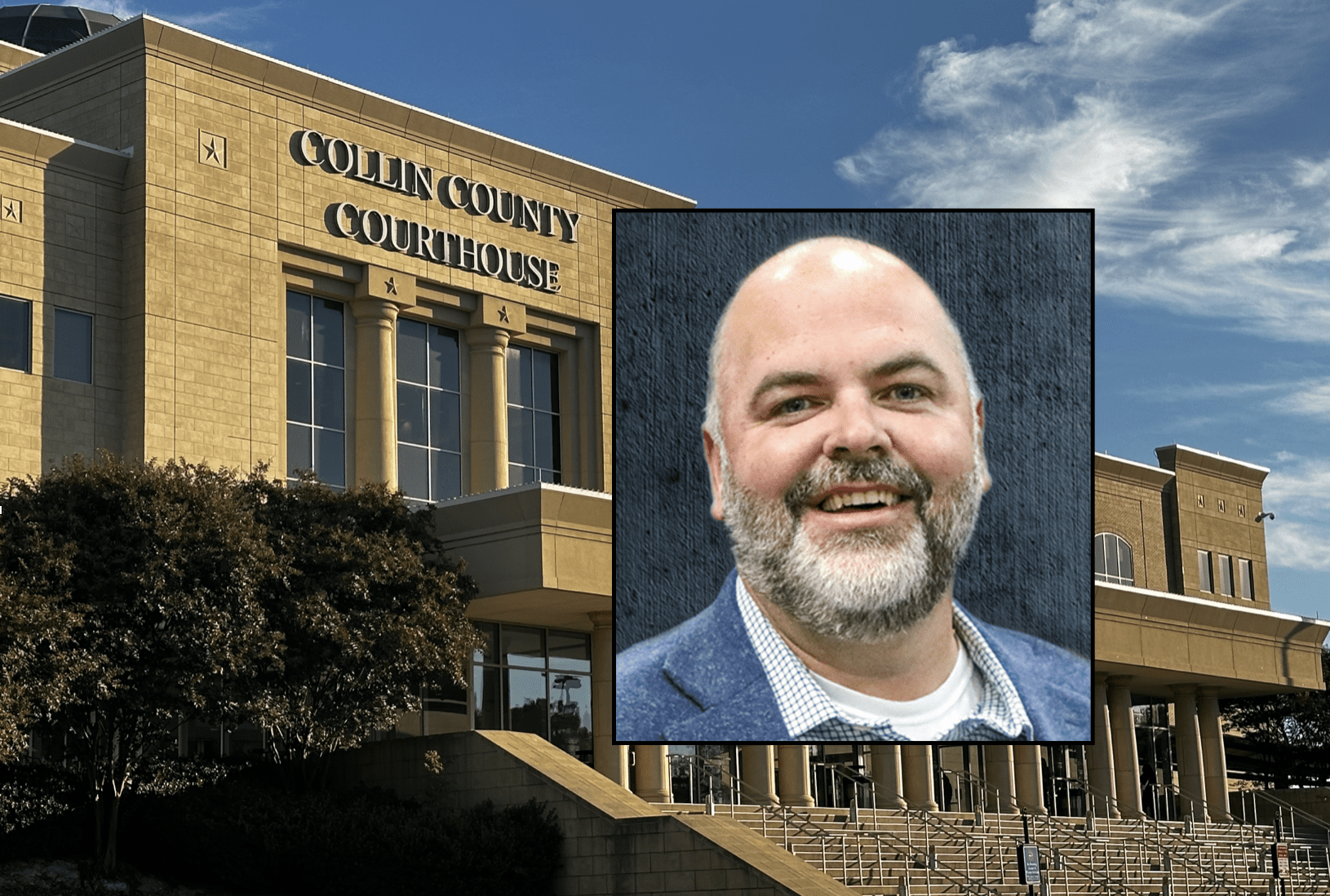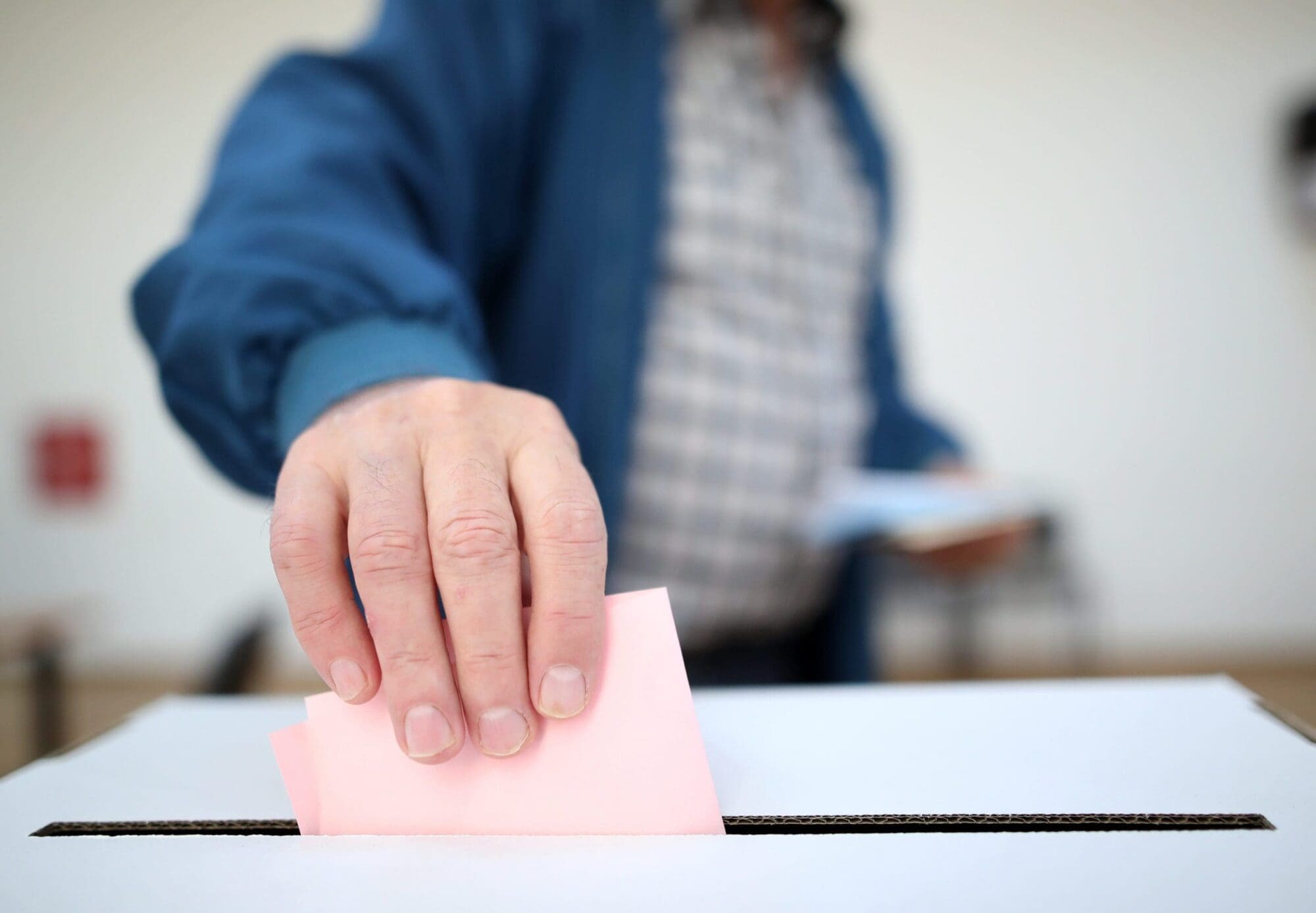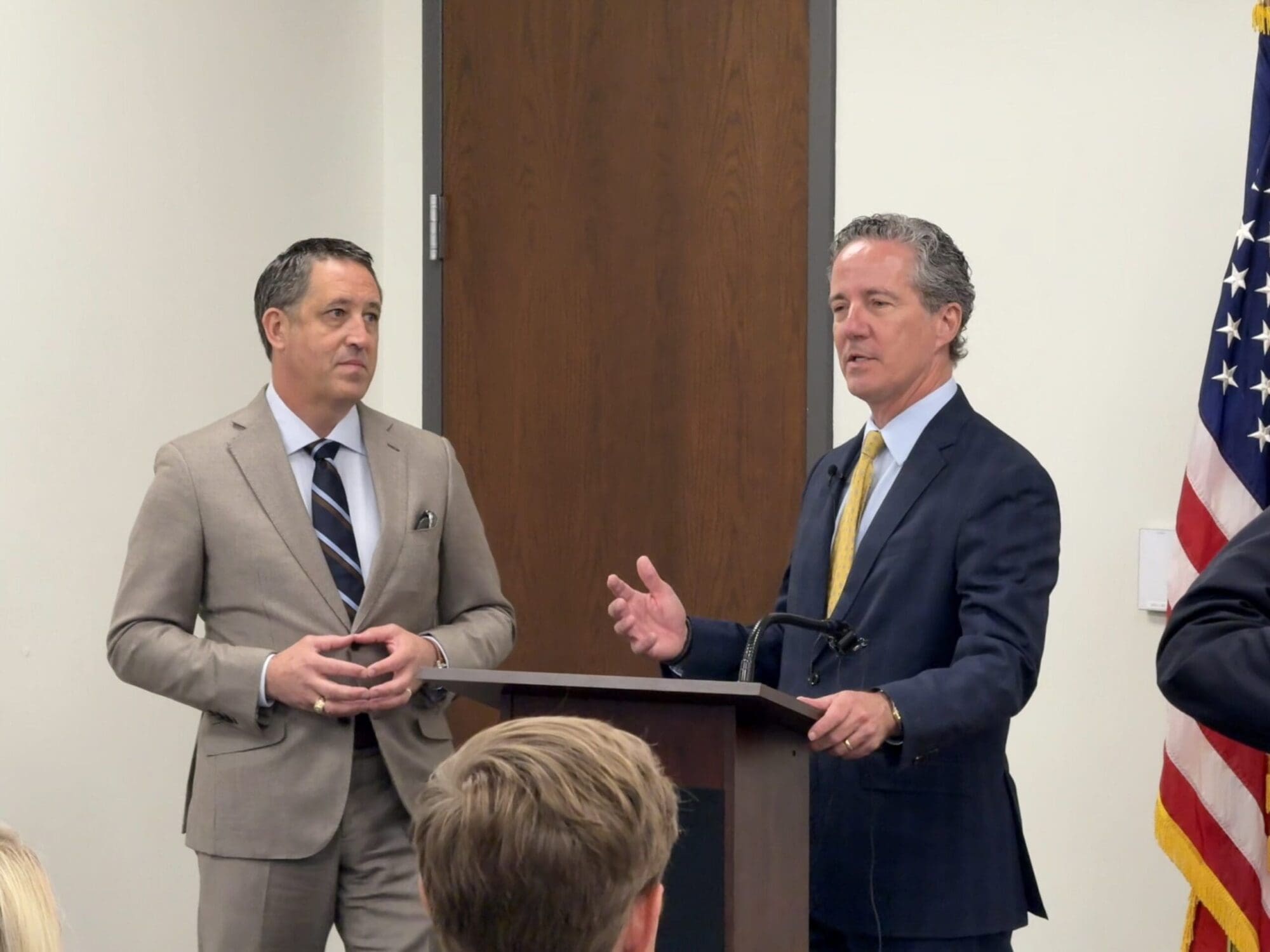In a sometimes-fiery public hearing lasting 17 hours, Texans told state representatives what they thought about Republican-priority election integrity legislation.
On Thursday, the Texas House Elections Committee began hearing public testimony on House Bill 6, the Election Integrity Protection Act of 2021, authored by committee chairman State Rep. Briscoe Cain (R–Deer Park).
Around 200 citizens showed up to speak on the high-profile comprehensive election reform bill. Many waited all night for their chance to testify. Some had made a return trip after last week’s hearing abruptly ended before they could talk.
Election integrity is a hot topic for Texans and a top legislative priority of the Texas GOP—the only one also declared an emergency item by Republican Gov. Greg Abbott, who said in a press conference with Cain last month he is ready to sign “robust” election reform bills sent to his desk by the Republican-controlled Legislature.
Cain said the overall goal of his bill is to bring consistency and uniformity to Texas elections and clarify the rules for voters, candidates/campaigns, poll workers, and elections administrators.
“It’s about protecting the election process for all Texans,” he said.
The most significant provisions of the bill would clarify the role of poll watchers, protect voters from unwanted assistance, expand laws prohibiting paid vote harvesting, increase election fraud penalties to felonies, and expedite court proceedings in election-related cases.
Citizens supporting HB 6 told committee members about problems they’ve experienced that the bill would address.
“Last week, I heard District Attorney John Creuzot say there’s no election fraud in Dallas County. I wish that were true,” said Wes Bowen, one of three Republican poll watchers who sued after being denied access to observe ballot board activity last November.
Creuzot, a Democrat, told the committee he hadn’t prosecuted any election fraud cases since being elected two years ago.
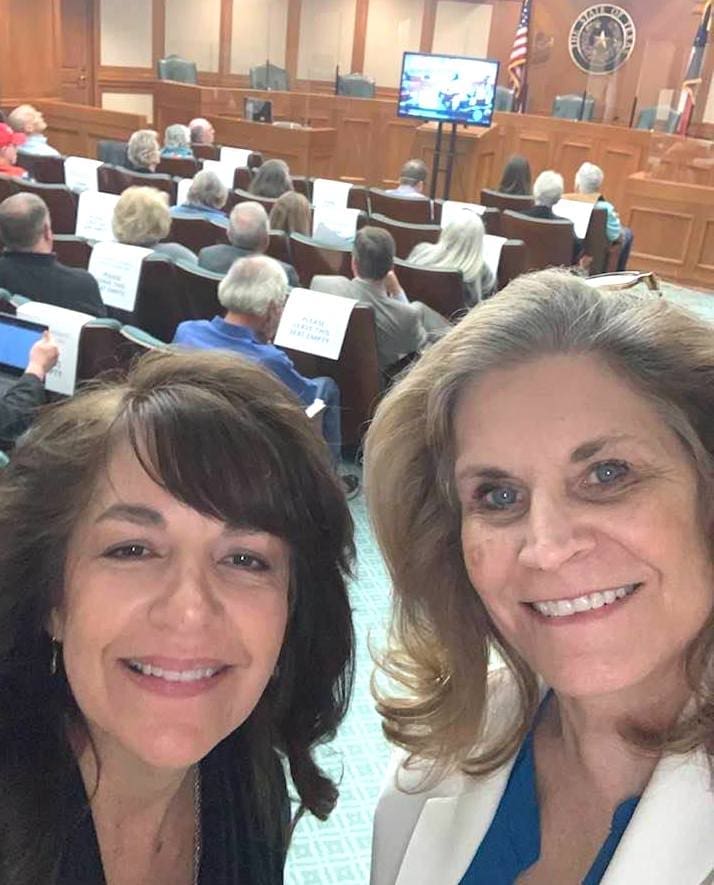 Susan Fountain, a Republican Party of Texas representative from Dallas, testified to mistakes she saw as a poll watcher in last year’s primary election. She said county election officials mixed up thumb drives containing electronic ballots from different polling locations—sloppy chain-of-custody between the polls and central count that poll watchers hadn’t been able to observe.
Susan Fountain, a Republican Party of Texas representative from Dallas, testified to mistakes she saw as a poll watcher in last year’s primary election. She said county election officials mixed up thumb drives containing electronic ballots from different polling locations—sloppy chain-of-custody between the polls and central count that poll watchers hadn’t been able to observe.
Dallas-area election attorney Elizabeth Bingham said she litigated more than a dozen cases in the last two election cycles of poll watchers being unlawfully obstructed by election officials.
“This happens every single cycle, many, many times,” Bingham said, adding the poll watcher protections in HB 6 are “absolutely necessary.”
Democrats and their allied advocacy groups (MALDEF, NAACP, and Texas Civil Rights Project) opposed the new poll watcher protections, saying they would allow watchers to intimidate voters and discourage people from serving as election workers.
“Poll watchers are not watching the voters; they’re watching the process,” Cain said.
Williamson County Election Administrator Chris Davis said he had experienced poll watchers who were disruptive or slowed down the process.
“A lot of us worked on this provision because we’ve seen poll watchers get kicked out for reasons other than being disruptive,” said committee member State Rep. Mike Schofield (R–Katy).
Bingham also testified at length about the importance of giving people their day in court by prioritizing and expediting election-related cases.
“After an election, many things become moot, and it calls into question what happened,” she said.
“It’s too late after an election to un-steal an improperly conducted election,” agreed Paul Simpson, a Republican attorney from Harris County, endorsing HB 6’s real-time enforcement of election laws.
Simpson also provided affidavits from the November 2020 election describing thousands of un-voted, unsecured mail-in ballots surrendered at polling places and picked up by people not identified as election officials—mail ballots that could be voted, with no chain of custody.
He said the loose ballots weren’t even mentioned in chain-of-custody records requested from the county elections office.
“We keep hearing all this isn’t happening,” said Schofield. “This is happening.”
In colorful testimony, one-time Houston school board candidate Gerry Monroe said a “Dream Team” of mail-ballot harvesters is operating in Harris County to keep certain politicians in power who are “destroying our African American community.”
“It’s not about black or white. It’s not about Republican or Democrat,” Monroe said. “It’s about money. … They’re running the same game all over Texas.”
Jonathan White, a prosecutor with the Texas attorney general’s office, testified that election fraud cases “are at an all-time high” and agreed voter fraud and election integrity are serious issues the Legislature should address.
White said his office saw a “tremendous spike” in 2020 in complaints of poll watchers being obstructed, but vote harvesting—“getting between the voter and their ballot”—remains the biggest problem, both through mail-ballot harvesting and coerced assistance at the polls.
He described a voter at the polls asking an assistant who had punched in ballot selections, ‘When do I get to vote?’, and the unscrupulous assistant responding, ‘You already did.’
“We don’t want people’s votes being cast by other people posing as assistants,” he said.
Schofield said lawmakers are “absolutely committed to stopping” vote harvesting by forced assistance, a key element of HB 6.
Chuck DeVore spoke in favor of the bill’s increased mail-ballot protections. He shared data from his Texas Public Policy Foundation research showing a five-fold increase in Texas voters’ use of mail-in ballots, which don’t require voter ID and are more vulnerable to fraud and manipulation by vote harvesters.
“Texas must lead, not follow” on election integrity, Republican U.S. Rep. Chip Roy (TX-21) told the committee. Roy said the Legislature should focus on securing mail ballots, the least secure form of voting, and maintaining clean voter rolls—both addressed in Cain’s bill.
Another of the bill’s provisions, raising the penalty for election fraud to a felony, is a specific election integrity goal of the RPT Legislative Priorities Committee, which this week added HB 6 to its list of recommended bills.
Similar legislation passed by the Texas Senate this week was publicly attacked by Fort Worth-based American Airlines—criticism that drew a rebuttal from Lt. Gov. Dan Patrick and others.
“National Democrats are making this bill to be a Jim Crow 2.0 voter suppression bill. It’s not Jim Crow 2.0, it’s Election Accountability 2.0,” said Demetria Smith, a Democrat who ran for Houston mayor in 2019, testifying in favor of HB 6. “Democrats are playing on our emotions … making a mockery of my suffrage so you can keep your own seats.”
“This bill is not going after voters,” Cain added. “It’s to give transparency and confidence to the system.”
The version of House Bill 6 presented Thursday would:
- speed up the process for reporting deceased Texans to voter registration officials
- clarify poll watchers’ purpose and duties, define “observe” as being “near enough to see and hear” election officials’ activities
- prohibit election judges from excluding or removing poll watchers without cause, and create penalties for officials who intentionally obstruct or refuse to accept watchers
- allow poll watchers to observe sealing and transfer of data storage devices from voting systems, as well as voters’ hand-delivery of marked mail-in ballots to election officials
- clarify who may be inside a polling place, early voting ballot board, or central counting station
- require voter assistants to complete a form
- add to voter assistants’ oath “under penalty of perjury” and “I did not pressure, coerce, or intimidate the voter into choosing me to provide assistance”
- clarify illegal mail-ballot assistance and make it a state jail felony
- add an offense for voting in Texas and another state in the same election
- increase the penalty for election fraud to a state jail felony, add as offenses knowingly counting invalid votes or failing to count valid votes
- make participating in paid “vote harvesting services” a third-degree felony
- prohibit public officials from distributing unsolicited mail ballots or applications
- prohibit public officials from altering, suspending, or waiving election procedures
- create a system for prioritizing and expediting court proceedings in election-related cases
Once the bill moves out of committee, it goes to the House Calendars Committee, where it may advance to the full House for consideration.
Texans can contact members of the Elections Committee and their state officials about HB 6 and other legislation.
Details about bills, along with resources to help citizens participate in the legislative process, are available at Texas Legislature Online.
